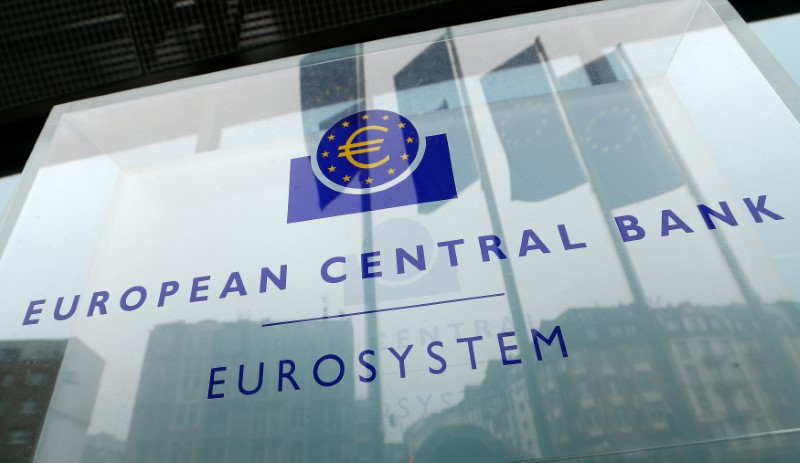* Global stocks subdued, U.S. futures point lower
* German Finance Minister Scholz hints at big fiscal push
* China factory-gate prices fall sharply in August
* Markets on edge before ECB meeting
* German 30-yr yields: https://tmsnrt.rs/2A8XP5y
By Karin Strohecker
LONDON, Sept 10 (Reuters) - Global bond yields rose on Tuesday, amid growing caution over the extent to which the European Central Bank will add stimulus to boost an ailing economy this week and rising hopes that Berlin could loosen its purse strings.
Germany's 30-year benchmark bond yield DE30YT=RR briefly broke into positive territory for the first time in more than a month, while U.S. Treasury yields US2YT=RR US10YT=RR US30YT=RR climbed to 18-day highs.
Safe-haven assets have been caught up in the fixed income sell-off, with gold XAU= slipping to its lowest level since mid-August and Japan's yen plumbing a five-week low.
But global stocks .MIWD00000PUS failed to make gains, as weak Chinese producer prices data dampened the mood, and U.S. shares were seen opening lower.
The bond moves come as markets are gearing up for Thursday's European Central Bank (ECB) meeting, which is widely expected to deliver a cut to interest rates and point to further bond-buying stimulus. there is a growing chorus of opinion that ECB policymakers and other central banks with negative interest rates and sub-zero long-term sovereign bond yields are nearing the limits of stimulus policies.
"Bond markets have priced in much of the gloomy outlook and made assumptions that additional stimulus is going to be provided by the ECB, so the scope for disappointment is there if the ECB doesn't provide as much as desired," said Stewart Robertson, senior economist at Aviva (LON:AV) Investors.
Meanwhile Germany's Finance Minister Olaf Scholz said the country could counter a possible economic crisis by injecting "many, many billions of euros" into the economy, signalling his readiness for a big stimulus package if the economy tips into recession. comments, at the start of the country's 2020 budget debate, come after Reuters reported Berlin was looking into creating a "shadow budget" to boost public investment and effectively circumvent limits set by its national debt rules. largest economy is teetering on the brink of recession, but strict national spending rules have tied policymakers hands on fiscal policy.
The U.S. Federal Reserve is also widely expected to cut interest rates next week as policymakers race to shield the global economy from risks, which also include Britain's planned exit from the European Union.
With interest rates plumbing record lows in many countries and the effectiveness of further bond-buying muted by already record-low borrowing costs for governments, attention has turned to increased public spending or tax cuts to fire up growth.
A CHINESE CLOUD
The sell-off in fixed income markets failed to inspire global stocks, where the mood was subdued amid concerns over the health of the world economy.
Asian bourses slipped lower after data showed China's mainland factory-gate prices shrank at their fastest pace in three years as flagging demand at home and abroad forced some businesses to slash prices. Europe, the pan-European stocks benchmark index STOXX 600 .STOXX fell 0.3% in a second day of losses, while France's CAC .FCHI slipped 0.2%.
"China inflation data was probably the worst combination of prints the market could have hoped for," said Stephen Innes, Market Strategist AXI Trader.
"While the enormous slide in China factory gate prices reminded us of what we already know, U.S. tariffs are sinking the Chinese economy and at a much quicker pace than anyone could have imagined."
However, Germany's export-oriented DAX index .GDAXI turned positive, helped by a Reuters report that Bank of Japan policymakers are now more open to discussing the possibility of expanding stimulus at their Sept. 18-19 board meeting due to the broadening fallout of the U.S.-China trade war. climbing bond yields helped lift European banking stocks .SX7P 1.8%, making financials the best performing sector on the continent.
U.S. stock futures ESc1 YMc1 NQc1 pointed to a lower open on Wall Street after the S&P 500 .SPX ended flat in New York on Monday. .N
In currencies, the rise in Treasury yields helped the dollar touch a five-week high of 107.50 yen JPY=EBS . The euro EUR=EBS was broadly flat at $1.104 after reaching an overnight high of $1.1067.
The pound GBP=D3 traded steady near a six-week high of $1.2385 after a law came into force demanding that Prime Minister Boris Johnson delay Britain's departure from the European Union unless he can strike a divorce deal with the bloc. futures hit their highest level in six weeks after Saudi Arabia's new energy minister confirmed he would stick with his country's policy of limiting crude output to support prices.
U.S. crude CLc1 traded at $58.43 a barrel after hitting the highest since July 31. Brent crude futures LCOc1 climbed to $63.23 a barrel. O/R
Prince Abdulaziz bin Salman, who became Saudi Arabia's new energy minister on Sunday, told reporters there would be "no radical" change in Saudi's oil policy. Saudi Arabia is OPEC's de facto leader. German 30-yr yield
